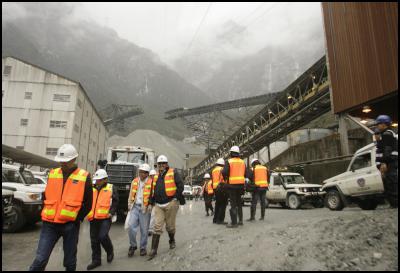Papuan Governor Disapproves of Freeport’s Smelter Plan
Papuan Governor Disapproves of Freeport’s Smelter Plan Outside Province
By Rangga Prakoso

Miners are seen at the Grasberg Mine, operated by US-based Freeport-McMoRan, in Papua province. (Reuters Photo/Muhammad Yamin)
Jakarta. Papua disapproves of mining giant Freeport Indonesia’s plan to build a smelter facility outside Papua, calling the move indicative of the company’s lack of good deeds to the nation’s easternmost province.
Papua governor Lukas Enembe said on Friday that for the past 50 years, Freeport Indonesia, the local/ unit of US mining company Freeport-McMoRan, only wanted to export the raw materials without having the good intention of building an integrated processing industry in Papua.
He said integrated smelter facilities in Papua are needed. Not only can the facilities help eradicate poverty, Lukas said, but they could also create jobs/ and strengthen Papua’s fiscal capacity.
“So, it is obligatory to build the smelter in Papua and not in Gresik, East Java. Freeport’s reason of lack of infrastructures is baseless because Freeport had never had strong commitments to help develop Papua,” he said at the House of Representatives’ building on Friday.
Freeport Indonesia signed/ on Thursday a memorandum of understanding with state-controlled fertilizer company Petrokimia Gresik, for renting land so that that it can establish a raw minerals processing facility near Petrokimia’s plant in Gresik.
Its progress toward construction of the smelter secured Freeport Indonesia’s export permit as the government extended the permit for another six months. Its current permit will expire on Jan. 25.
Freeport Indonesia’s construction of the copper smelter in East Java is part of its $15 billion expansion in mining operations in the country.
Lukas said that the Papuan administration with local administrative offices are ready to cooperate with Freeport Indonesia for the creation of the integrated smelter facility in Papua. He called for the central government to issue special policies for Papua.
“The policies included investment/ facilities, fiscal and non-fiscal incentives and capital access,” Lukas said.
ENDS


 Save The Children: GAZA - New Year Begins With More Children Killed By Israeli Airstrikes
Save The Children: GAZA - New Year Begins With More Children Killed By Israeli Airstrikes OHCHR: UN High Commissioner For Human Rights Volker Türk On Abolition Of Death Penalty In Zimbabwe
OHCHR: UN High Commissioner For Human Rights Volker Türk On Abolition Of Death Penalty In Zimbabwe APEC: Building A Sustainable Tomorrow - APEC Returns To Korea After 20 Years
APEC: Building A Sustainable Tomorrow - APEC Returns To Korea After 20 Years Aotearoa Healthcare Workers For Palestine: Wellington Healthcare Workers Demanding Overdue Government Action On Renewed Brutal Israeli Attacks On Gaza
Aotearoa Healthcare Workers For Palestine: Wellington Healthcare Workers Demanding Overdue Government Action On Renewed Brutal Israeli Attacks On Gaza WHO: WHO Continues To Urge China To Share Data Five Years After COVID-19
WHO: WHO Continues To Urge China To Share Data Five Years After COVID-19 WMO: 2024 To Become The Hottest Year On Record
WMO: 2024 To Become The Hottest Year On Record